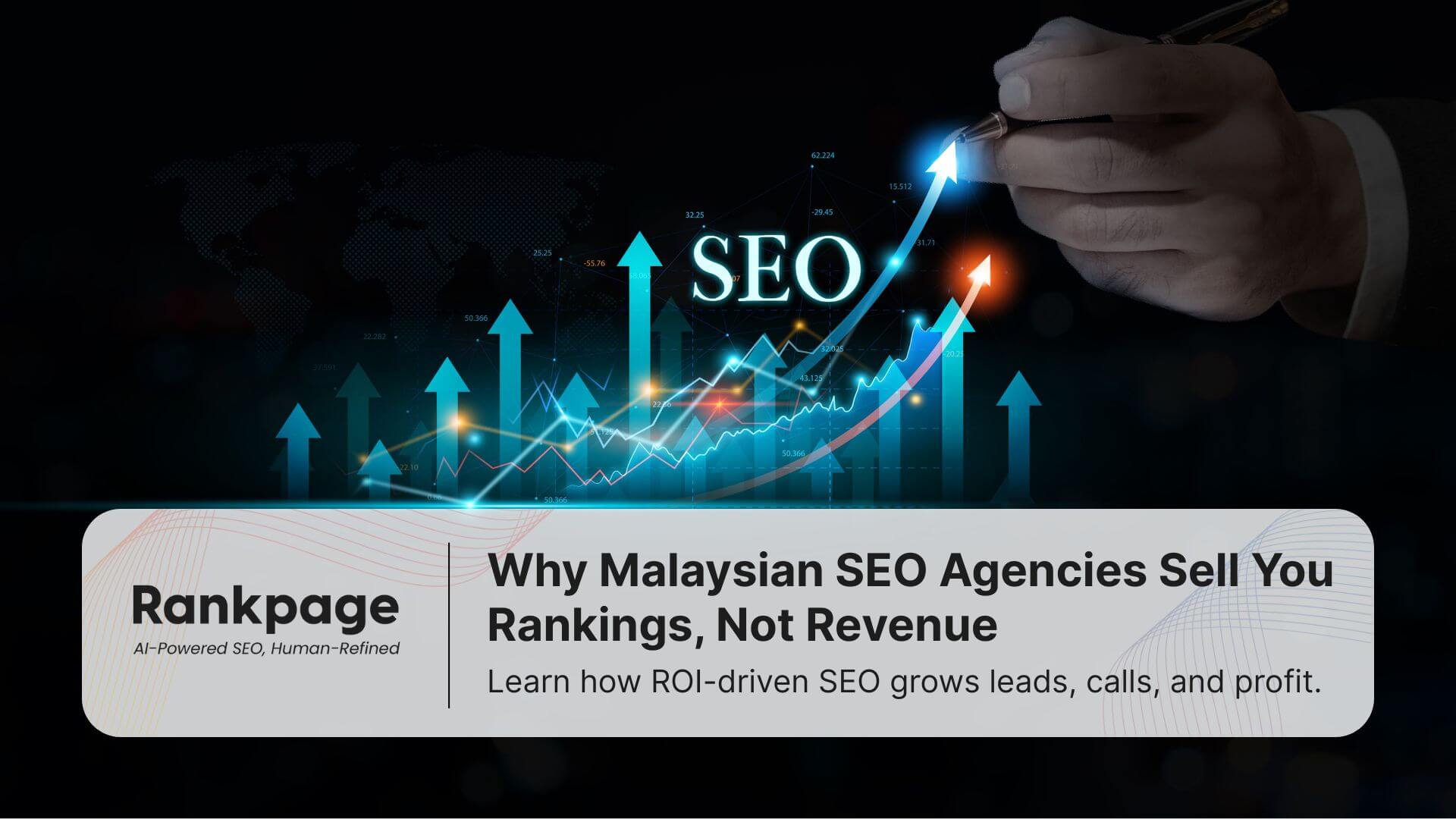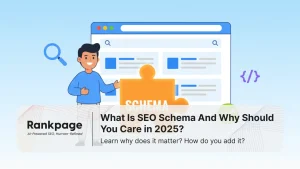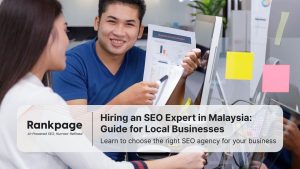Key Takeaways
- Many SEO agencies in Malaysia sell rankings because they’re easy to show, not because they grow businesses.
- Rankings ≠ revenue: being #1 doesn’t guarantee leads or sales.
- AI Overviews and zero-click results make traditional ranking reports less meaningful in 2025.
- Revenue-driven SEO starts with business goals, not vanity keywords.
- Rankpage tracks conversions, sales, and ROI, making SEO accountable for growth, not just traffic.
SEO agencies in Malaysia love selling rankings, promising things like “We’ll get you to page one within 90 days.” But page one doesn’t pay the bills.
Customers do.
Think about it: your site ranks #1 for “best accountant KL.” Yet your enquiries are flat, sales are not coming in and Google Maps still get the clicks, but no phone calls. This is the trap of ranking-only SEO.
We’ve seen enough and decided that today, we’ll unpack why agencies push rankings, why it doesn’t translate into revenue, and how to choose strategies that actually drive growth.
Table of Contents
Comparison Table: Rankings vs Revenue SEO
Factor | Ranking-Only SEO | Revenue-Focused SEO |
Goal | Top positions for keywords | Leads, calls, sales growth |
Metric Tracked | SERP positions | Conversions, ROI, pipeline impact |
Approach | Content + backlinks only | AEO, buyer keywords, conversion funnels |
Report | Keyword ranking charts | Leads, enquiries, booked revenue |
Longevity | Vulnerable to AI Overviews & SERP changes | Built to adapt across Google + AI answers |
Why SEO Agencies Promise Rankings First
Rankings are the easiest story to sell.
Agencies know that showing a #1 spot on Google is simple proof of “success.” It looks good in a pitch deck, and it’s easy for a client to understand.
But here’s the reality:
- Rankings don’t equal revenue. A screenshot showing “#1 for KSL hair salon” doesn’t mean your chairs are full on weekends.
- Reports hide the gaps. Agencies showcase keyword charts, but those don’t tell you if enquiries, bookings, or sales actually increased.
- The illusion works, for a while. Business owners feel reassured seeing themselves on page one, until they realise nothing’s changed at the cashier.
Here’s an Example
Imagine a café in Bangsar being promised “top ranking for best café KL.”
Great! But if the listing doesn’t convert into reservations or GrabFood orders, that rank is just vanity. The café owner sees traffic on Google Analytics, but not customers through the door.
Why Agencies Stick To It
- Rankings are fast to demonstrate: move from page 5 to page 2 in a month, and they’ll call it a win.
- They’re easy to package: a slide with green arrows pointing up makes SEO look like magic.
- Most clients don’t ask deeper questions: “Are these keywords driving sales?”
“We always recommend our clients to ask us questions on how ranking top 1 would impact their bottomlines and sales, because it shows they understand the high ROI value they are getting from working with us.” – Rankpage Senior SEO Specialist.
Why Ranking 1st Does Not Translate to Sales
Ranking for a keyword doesn’t guarantee revenue. Here’s why:
- High search volume ≠ high buyer intent
For example, “audit meaning” might bring thousands of visitors, but none of them want to hire an auditor. Meanwhile, “hire tax agent Malaysia” is searched less, but carries direct purchase intent. - Clicks don’t equal conversions
You might get thousands of visitors, but if your booking system, enquiry form, or calls-to-action aren’t optimised, the traffic just bounces. - Google SGE and AI Overviews cut clicks
More Malaysians are seeing answers directly on Google, Gemini, or Bing Copilot. Being #1 in the blue links doesn’t matter if users never click. - Competitors and aggregators dominate clicks
Even if your site ranks, Google Maps, Fave, or Clutch might still get most of the traffic.
“A tiny head of keywords dominates volume: the top 500 queries capture 8.4% of all searches; the top 2,000 capture 12.2%” – Backlinko
What Does Revenue-Driven SEO Look Like?
If ranking-only SEO is about vanity, revenue-driven SEO is about impact.
One is like flexing in front of the mirror, the other is like hitting the gym and actually getting stronger.
Revenue-driven SEO starts with what matters most, business outcomes. Leads, sales, bookings, and revenue. The rankings are still there, but they’re not the hero of the story anymore.
Business goals → SEO strategy
Instead of agencies asking, “What keywords do you want to rank for?” the smarter question is: “What enquiries or sales keep your business running?”
A tuition centre in Kajang doesn’t need to rank for “best education Malaysia.” It needs parents searching “math tuition Kajang fees” to find them. Intent = Conversions.
Buyer keywords over vanity keywords
High-volume phrases like “Cafe in PJ” look fancy in a report but often bring the wrong crowd.
If you are a pet-friendly cafe, intent-heavy searches like “Pet-Friendly cafes in PJ” would definitely serve your niche better, and you attract the right customers and their furry little friends!
“Would you rather have 1,000 curious onlookers in your shop, or 10 customers ready to pay?”
Tracking what matters
Ranking charts may impress, but they don’t pay salaries. Revenue SEO tracks things like:
- Enquiry forms submitted
- Calls from your Google Business Profile
- Booked appointments
- Actual sales attributed to organic search
In Malaysia, too many reports still end with “Congrats, you’re #1 for [keyword].” That’s like telling a mamak stall owner: “Boss, your nasi lemak looks amazing on Instagram,” while nobody’s actually eating it.
AEO-First Strategy
Do you know what AI is? Of course you do, it’s everywhere.
Your customers know it too, because half of them are already asking Gemini, ChatGPT, or Bing Copilot for recommendations before they even open Google.
That’s where Answer Engine Optimisation (AEO) comes in. Instead of fighting for a blue link buried under ads, map packs, and AI summaries, AEO services makes sure your brand shows up inside the answers themselves.
- Where Malaysians now search: Google’s AI Overviews, voice queries on Siri and Alexa, TikTok search, and even community-driven platforms like Xiaohongshu.
- What it looks like in practice: When someone searches “best spa deal KL 2025” or “audit firm near me,” the AI pulls data from trusted sources. If your business isn’t anchored there with reviews, schema, and citations, you won’t get mentioned.
- Why it matters: Being cited in AI answers isn’t just visibility, it’s authority. People trust answers more than a lonely #5 organic link.
If you’re still interested in AEO, we do have a blog explaining the difference between SEO vs AEO.
6 Questions to Test If Your SEO Agency Is Worth the Fees
Before you commit monthly budgets, test your SEO agency with these must-ask questions. If they can’t answer, your money is better spent elsewhere.
Question | Why It Matters | Red Flag Answer | What a Good Agency Says |
1. How do you measure success? | Rankings alone don’t pay bills, revenue does. | “We’ll get you to page one.” | “We track leads, conversions, and revenue impact.” |
2. Which keywords will you target? | Buyer intent > vanity keywords. | “High-volume terms only.” | “We target search terms tied to sales, not just traffic.” |
3. How do you report progress? | Reports must show ROI, not just positions. | “Here’s a keyword chart.” | “You’ll see calls, enquiries, and revenue data.” |
4. How do you build links? | Link quality beats quantity for long-term trust. | “We buy 1,000 links monthly.” | “We earn links through content, PR, and authority sites.” |
5. What’s your AEO strategy? | AI Overviews & snippets are where buyers search. | “We don’t focus on AI.” | “We optimise for AI citations and voice search.” |
6. Can you show past results in Malaysia? | Local context proves credibility. | “We don’t share case studies.” | “Here’s how we grew enquiries for a KL client in 2024.” |
The right agency (like us!) won’t dodge tough questions. If all you hear is jargon, that’s your sign to walk away.
So, Should You Care About Rankings at All?
Yes, but only as a milestone, not the finish line.
- Rankings are still useful as visibility signals.
- They help you measure if content is being indexed and crawled.
- But they should never be the final KPI.
Why Rankpage Does It Differently
At Rankpage, we’ve seen every Google update and every recycled SEO sales pitch. What makes us different is simple: we don’t stop at rankings.
- 8 years of SEO experience: We’ve watched the Malaysian SEO scene shift from keyword stuffing to AI Overviews.
- AI + AEO strategies: We optimise for visibility in Gemini, ChatGPT, and Google SGE, not just the SERPs.
- ROI-first reporting → We show leads, calls, and conversions, not just keyword charts.
- Industry-tailored strategies: Healthcare, retail, education, tech, finance, each requires a customised SEO + AEO mix.
Don’t Buy Rankings, Buy Growth
Ready to stop chasing page one and start growing profit? Explore our SEO services so you get the only thing that matters, revenue.
Frequently Asked Questions About SEO Agencies
Why Do SEO Agencies In Malaysia Focus On Rankings?
Because rankings are easier to show than revenue, but they don’t guarantee leads or sales.
What’s The Difference Between Rankings And Revenue In SEO?
Rankings = visibility. Revenue = growth through enquiries, calls, and sales.
Can I Rank #1 And Still Not Get Customers?
Yes. High-volume keywords often bring clicks but no conversions if buyer intent is missing.
How does AEO help SEO deliver revenue?
AEO ensures your business appears in AI Overviews and snippets where buyer intent is strongest.
Should I Ignore Rankings Completely?
No. They’re still useful, but only as one step toward revenue-focused SEO.
How Is Rankpage Different From Other SEO Agencies?
We don’t just sell rankings. We track ROI, optimise for AI search, and design strategies that actually drive growth.





